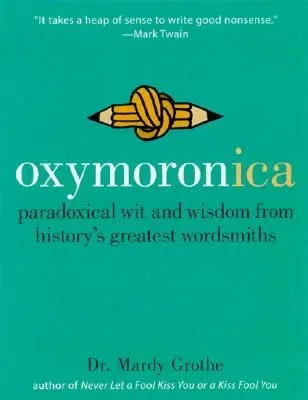Mardy Grothe
(Author)Oxymoronica: Paradoxical Wit and Wisdom from History's Greatest WordsmithsHardcover, 2 March 2004

Qty
1
Turbo
Ships in 2 - 3 days
In Stock
Free Delivery
Cash on Delivery
15 Days
Free Returns
Secure Checkout

Print Length
246 pages
Language
English
Publisher
Harper
Date Published
2 Mar 2004
ISBN-10
0060536993
ISBN-13
9780060536992
Description
Product Details
Author:
Book Format:
Hardcover
Country of Origin:
US
Date Published:
2 March 2004
Dimensions:
18.29 x
14.73 x
2.29 cm
ISBN-10:
0060536993
ISBN-13:
9780060536992
Language:
English
Location:
New York, NY
Pages:
246
Publisher:
Weight:
322.05 gm